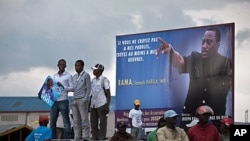In the Democratic Republic of Congo, presidential campaigning is entering its final week with the incumbent leader facing 10 challengers, including a former prime minister.
President Joseph Kabila's biggest challenger in this election is the long-time opposition leader and former prime minister Etienne Tshisekedi.
The president came to power after the 2001 assassination of his father, Laurent Kabila, who led the rebellion against dictator Mobutu Sese Seko when the country was called Zaire.
Joseph Kabila won re-election in a 2006 vote that was marred by violence following his second-round run-off against a former rebel leader. This time, President Kabila is facing the 78-year-old Tshisekedi, who both worked with and ran against Mobutu.
Earlier this month, President Kabila's government shut down the private Radio Lisanga television station following a broadcast in which Tshisekedi declared himself president “appointed by the people” and called on supporters to free alleged political prisoners.
In an interview with VOA's French Service, Tshisekedi said he “did not ask the people to take up weapons” but was instead calling for their “mobilization.”
Tshisekedi says dictatorship has no place in a democracy and the world should know that democracy is now in Congo. He says his call on supporters to break colleagues out of prison does not compare to what he says are the large numbers of opposition supporters killed by the Kabila government.
Campaigning in the eastern Kivu provinces, President Kabila promised to crush anyone who starts violence in a country where more than two million people died during civil wars that involved troops from Rwanda, Uganda, Angola, Namibia and Zimbabwe.
President Kabila says his opponents are saying that if they do not win these elections, they will start fighting. The president says they can not fight. And if they do start a war, Kabila says the government will crush them.
The United States, European Union and United Nations have expressed concern about electoral violence. The International Criminal Court says it will investigate election-related crimes as it is doing in Ivory Coast and Kenya.
Congo's electoral commission says presidential and legislative voting is still on schedule for November 28, despite concerns by some electoral observers about the pace of distributing voting materials in a country the size of Western Europe.
Opposition leader Tshisekedi says the contest must not be postponed.
Realistic or not, Tshisekedi says the date of the election is obligatory and the electoral commission has no choice because President Kabila's mandate ends in December. If the government does not respect the date of the vote and fails to properly organize these elections, Tshisekedi says it will be fatal and risks, in his words, setting the nation on fire.
There are 11 presidential candidates in the first vote since Congo's constitution was changed to eliminate a run-off election if no one gets more than 50 percent of the vote. This time, whoever gets the most votes wins. More than 18,000 Congolese are standing for seats in parliament.
The electoral commission says final results of the vote will be compiled December 5 and published December 6, which is the last day of President Kabila's current mandate.
Presidential Campaign in DR Congo Enters Final Week












